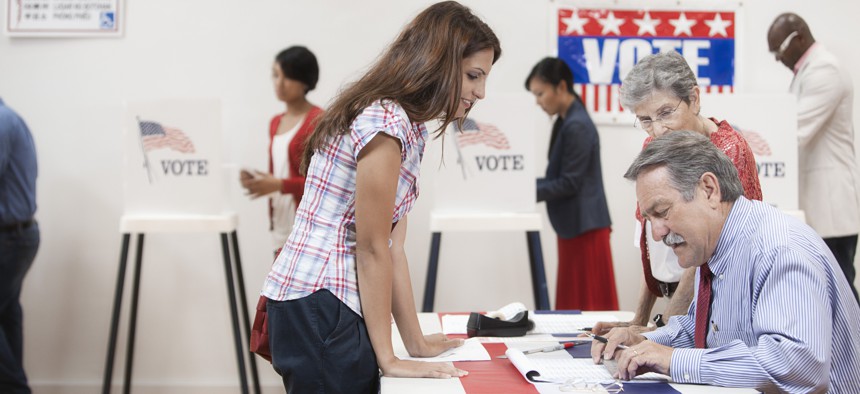New Jersey joins multistate effort to clean up voter registration data

GettyImages/Hill Street Studios
The state will send names, addresses, dates of birth, and a slew of other information about its voters to the Electronic Registration Information Center, which will compare them to data from other states to detect registrations that are no longer accurate.
New Jersey will share voter registration data with more than 30 other states as part of a multistate cooperative to improve the accuracy of voter rolls.
As part of joining the Electronic Registration Information Center, a nonprofit operated by representatives from member states, New Jersey will send names, addresses, dates of birth, and a slew of other information about its voters to the organization, which will compare them to data from other states to detect registrations that are no longer accurate.
The information sharing will allow election officials to update voter rolls without hearing directly from voters — who rarely inform election officials of a change of address or death — while keeping some safeguards still in place, said Henal Patel, director of the New Jersey Institute for Social Justice’s Democracy and Justice program.
“That’s something we see consistently in New Jersey. We always hear things about, ‘Hey, we got a sample ballot for my son, who moved to California five years ago’ or ‘Why is my mother who passed away still receiving election mail,’” Patel said.
Additionally, ERIC’s member states are required to send mailers to eligible but unregistered voters with information on how to register. In New Jersey, voters can register online, in person, by mail, and during certain Motor Vehicle Commission visits.
“This is a good step, an important one to make our rolls stronger, and again, because so many states are already participating in ERIC and have for a number of years, we know it works,” Patel said. “This is not something new or radical we’re trying. This is something that’s tested and true.”
Member states who don’t meet certain requirements risk being removed from the organization.
The state’s entry into ERIC closely follows the signing of a bipartisan bill that allows for remote training for poll workers and permits election staff salaries to exceed a 2% cap imposed on some other expenses. That bill, which passed unanimously in both chambers, also requires the state to join ERIC.
Gov. Phil Murphy last year signed a separate bill that authorizes the secretary of state’s office and the Motor Vehicle Commission to share voter information with ERIC. That bill was also broadly bipartisan, though it faced opposition from a handful of Republicans in the Assembly.
Election officials and voting advocates who frequently butted heads during the state’s most recent voting reform push aligned behind New Jersey’s entry into ERIC, and while the process is still ongoing, officials expect it will make it easier to maintain clean voter rolls.
Dawn Addiego, Burlington County’s superintendent of elections, said she’s pleased by the development.
“Joining ERIC should provide us access to other member states’ voter registration data and help us more easily identify voters who may have moved or who have duplicate registrations,” Adding said. “It’s another layer of security that can help us ensure the integrity of our voter registration rolls and our elections.”
Counties are still awaiting guidance on ERIC from state election officials, Addiego said.
In June, the Public Interest Legal Foundation, a conservative group, sued Secretary of State Tahesha Way, seeking information and documents regarding how the state maintains its voter rolls.
The group said it found more than 8,000 New Jersey voters who had registered more than once, alongside nearly 2,400 voters whom the group believes are dead and more than 30,000 who the group claims have fictitious or placeholder birth dates.
That suit is ongoing, and the state claims disclosing an instructional module on the maintenance of its voter registration system would expose vulnerabilities in state election systems.
The use of ERIC data should reduce the number of erroneous registrations.
“Joining ERIC is a powerful step to strengthen New Jersey’s elections by increasing our ability to support eligible voters while also improving the accuracy of our voting rolls,” Way said in a statement. “This partnership will help more New Jerseyans participate in democracy while giving all our voters greater confidence in the integrity of our elections.”
New Jersey Monitor is part of States Newsroom, a network of news bureaus supported by grants and a coalition of donors as a 501c(3) public charity. New Jersey Monitor maintains editorial independence. Contact Editor Terrence McDonald for questions: info@newjerseymonitor.com. Follow New Jersey Monitor on Facebook and Twitter.





